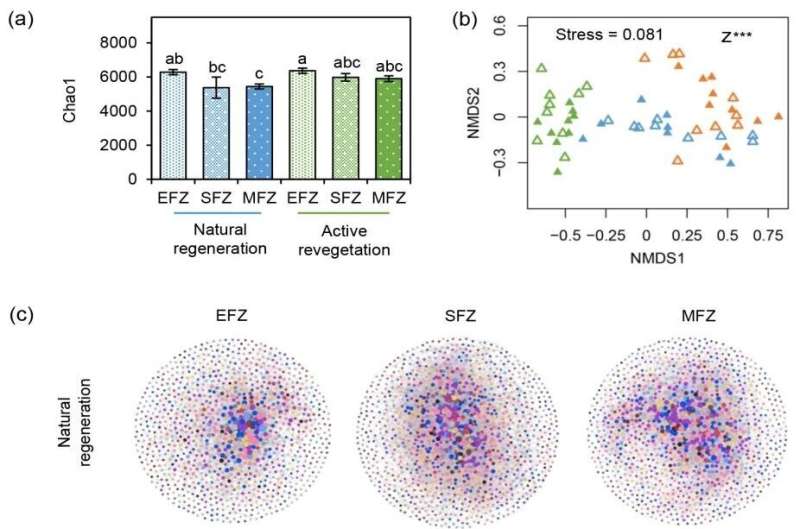Vegetation restoration, hydrological change affect carbon and nitrogen cycling in novel riparian ecosystem

Worldwide hydroengineering, such as reservoir construction, creates novel hydrological regimes in riparian zones, resulting in biodiversity loss and ecosystem degradation. Active revegetation (AR) and natural regeneration (NR) have been widely used in degraded riparian ecosystems to recover biodiversity and ecosystem functions. How restoration approaches and hydrological changes influence key processes of carbon and nitrogen cycling in reservoir riparian zones has not been elucidated, however.
Researchers at the Wuhan Botanical Garden of the Chinese Academy of Sciences (CAS) have investigated the effects of restoration approaches and hydrological changes on soil properties, vegetation diversity, microbial characteristics, denitrification rates, and greenhouse gas fluxes at three flooding zones (extreme flooding zone, severe flooding zone, and moderate flooding zone) in both AR and NR sites in the Three Gorges Reservoir.
According to the researchers, compared with NR, AR did not significantly impact vegetation diversity, the diversity of microbial communities, and soil denitrification rates, but reduced soil ammonium and total carbon contents.
In addition, compared with other two flooding zones, the extreme flooding zone was observed to have higher denitrification rates and CO2 fluxes, which could be attributed to the high nutrient content. Furthermore, the effects of flooding zone were found to override the impacts of restoration approaches.
This study adds to the understanding of restoration strategies for degraded riparian ecosystems. The interactions among soil, plants, microbes, and biochemical processes may be beneficial for modeling and predicting future impacts on nitrogen removal efficiency and regulating climate in restored riparian ecosystems.
The study, titled "Effects of flooding outweigh those of vegetation restoration on key processes of carbon and nitrogen cycling in a degraded riparian zone," was published in Catena.
More information: Yu Gong et al, Effects of flooding outweigh those of vegetation restoration on key processes of carbon and nitrogen cycling in a degraded riparian zone, CATENA (2022).
Provided by Chinese Academy of Sciences



















